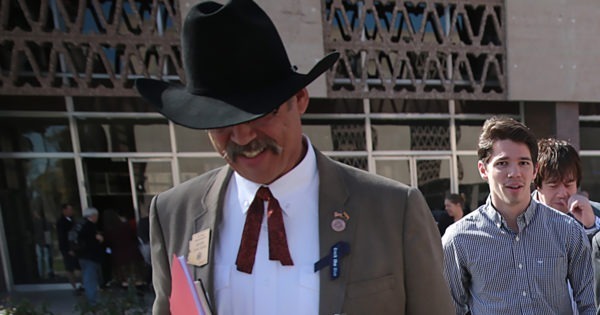
Arizona Representative Mark Finchem exclusively revealed how the state can take back its legislative power to assign Electoral College votes without the need of a special session.
Arizona, as one of the many states that is being contested due to severe electoral irregularities and voter fraud, is currently seeing a push to decertify their 11 Electoral College votes for Joe Biden. However, as Governor Doug Ducey has not called the Arizona Legislature back early, they cannot currently vote on the matter – the new session is scheduled to start on January 11th.
The Arizona constitution states that in order for the legislature to call themselves into a special session, a super majority of two-thirds would be required. A legal brief, written by Arizona State Representative Mark Finchem, disputes this.
As National File reported, the brief, which was originally disseminated among Arizona legislators, argues that the American Constitution is the supreme law of the land, not the state’s constitution, therefore meaning that the Arizona Legislature is not bound by its own statutes to call itself into a special session to decertify fraudulent votes.
Speaking exclusively to National File, Finchem also revealed a way that the legislature could bypass using a special session altogether if the legislative leadership “refuses to recognize [that they don’t need a super majority] under the legal theory” that he wrote the memo on:
To fulfill our federal duty we cannot be tied to a state statute that is designed to remedy state issues. We’re not tethered to that. If we can’t get a two-thirds majority, and they’re married to that idea, and we can’t get the govenror to call a special session, let’s go back and revisit the term “manner.” The legislature has plenary power to define “manner”…
If the legislature is solely responsible, with plenary power, for defining the manner in which electors will be transmitted to the Congress, that means the legislature- in my view – could, with a simple majority, craft a legislative memo to the Vice President and to the Arizona caucus, and state representatives, and say “We, as a majority, of the House and the Senate… inform the Vice President and the Arizona Caucus that, due to irreconcilable fraud, the evidence of which is attached to this memo, we are informing you that it is our desire to reclaim our Electoral College electors, and at the very least, do not consider any Arizona electors. But, based upon the evidence we’re presenting, Mr. Vice President you may feel comfortable in knowing that Donald Trump was the rightful winner of this contest.”
It is important to note that Finchem said that such a move to take back Electoral College votes with a memo should ideally be backed up by a forensic audit, so that the Arizona legislators can “point to exact ballots that are fraudulent.” He described the audit as “critically important” to reach the threshold of a preponderance of evidence, “enough for a court to say ‘there’s fire here, not just smoke’.”
Unfortunately, the forensic audit in Maricopa County is currently being held up and delayed by the county’s Board of Supervisors, who last month, voted to resist subpoenas issued by the Arizona State Senate that were designed to assist the audit. At the time of writing, no movement has been made by the courts in forcing the Board of Supervisors to accept the legitimate subpoenas.
Finchem is a rising star in the national conservative movement. At a rally in Georgia on Monday night to support Senators David Perdue and Kelly Loeffler in their run-off races, President Trump read out a letter from Finchem. The letter from Finchem, who the President described as a “great political leader” and “a very respected man,” noted just how many Arizona residents were crying out for election integrity.
I am honored President @realDonaldTrump read my letter at the Georgia #TrumpRally.
We deserve fair and HONEST elections! https://t.co/VUiKqdjODd
— Mark Finchem (@MarkFinchem) January 5, 2021
The Arizona Representative was locked out of his Twitter account for encouraging Arizona residents to call up the Board of Supervisors and voice their complaints about their resistance of the subpoenas. “They do not understand just how much of a gutful the people in Arizona have had of their shenanigans. You’ve got a lot of very angry people now,” Finchem said. “I’ve got news for you folks. This ain’t going away.”